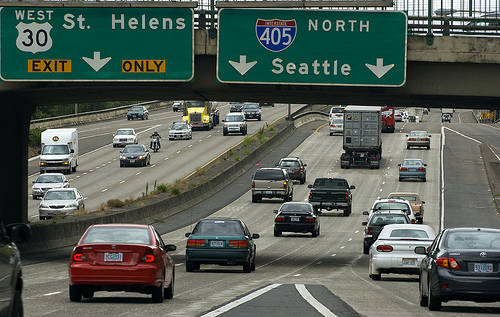Oregon’s highway system ranks 12th in the nation in overall cost-effectiveness and condition, according to the Annual Highway Report published today by Reason Foundation. This is a significant improvement, up nine spots, from the previous report, where Oregon ranked 21st overall.
In safety and performance categories, Oregon ranks 12th in structurally deficient bridges, 17th in traffic congestion, 23rd in urban Interstate pavement condition and 34th in overall fatality rate. On spending, Oregon ranks 21st in total spending per mile and 13th in capital and bridge costs per mile.
“Oregon’s improvement would have been even greater if not for high overall and rural fatality rates. Compared to nearby states, the report finds Oregon’s overall highway performance is better than California (ranks 43rd), Washington (ranks 37th), Idaho (ranks 13th), and Nevada (ranks 27th),” said Baruch Feigenbaum, lead author of the Annual Highway Report and assistant director of transportation at Reason Foundation.
Oregon’s best rankings are in rural arterial pavement condition (9th) and structurally deficient bridges (12th). Oregon’s worst rankings are rural fatality rate (42nd) and overall fatality rate (34th).
Oregon’s state-controlled highway mileage makes it the 33rd largest highway system in the country.
Utilizing data that states submitted to the federal government, Reason Foundation’s 24th Annual Highway Report measures the condition and cost-effectiveness of state-owned roads in 13 categories, including pavement condition on urban and rural Interstates, deficient bridges, traffic fatalities, administrative costs, and spending per mile on state roads.
North Dakota ranks first in the Annual Highway Report’s overall performance and cost-effectiveness rankings for the second year in a row. Virginia and Missouri, two of the 20 most populated states in the country, are second and third in overall performance and cost-effectiveness. Maine and Kentucky round out the top five states.
The highway systems in New Jersey (50th), Alaska (49th), Rhode Island (48th), Hawaii and Massachusetts rank at the bottom of the nation in overall performance and cost-effectiveness.
The full Annual Highway Report, complete rankings in each category, and historical data from previous editions are available here:
https://reason.org/policy-study/24th-annual-highway-report/
https://reason.org/wp-content/uploads/24th-annual-highway-report-2019.pdf
Oregon’s Complete Results
Ranking (out of 50 states)
• Overall Rank (*see explanation below): #12
• Overall Rank in Previous Report: #21
Ranking in Each Category
• Total Disbursements per Mile – #21
• Capital-Bridge Disbursements per Mile – #13
• Maintenance Disbursements per Mile – #25
• Administrative Disbursements per Mile – #31
• Rural Interstate Percent in Poor Condition – #15
• Urban Interstate Percent in Poor Condition – #23
• Rural Other Principal Arterial Percent in Poor Condition – #9
• Urban Other Principal Arterial Percent in Poor Condition – #15
• Urban Area Congestion* – #17
• Structurally Deficient Bridges, Percent* – #12
• Overall Fatality Rate – #34
• Rural Fatality Rate – #42
• Urban Fatality Rate – #19
*The Annual Highway Report is based on spending and performance data submitted by state highway agencies to the federal government for 2016 as well as urban congestion data from INRIX and bridge condition data from the Better Roads inventory for 2017. For more details on the calculation of each of the 13 performance measures used in the report, as well as the overall performance measure, please refer to the appendix in the main report. The report’s dataset includes Interstate, federal and state roads but not county or local roads. All rankings are based on performance measures that are ratios rather than absolute values: the financial measures are disbursements per mile, the fatality rate is fatalities per 100 million vehicle-miles of travel, the urban congestion measure is the annual delay per auto commuter, and the others are percentages. For example, the state ranking first in structurally deficient bridges has the smallest percentage of structurally deficient bridges, not the smallest number of structurally deficient bridges.
Reason Foundation’s transportation experts have advised four presidential administrations, along with numerous state and metro transportation departments and planning organizations. Baruch Feigenbaum is lead author of the Annual Highway Report and his bio information is available here:
https://reason.org/author/baruch-feigenbaum/









